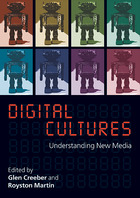Robert Hassan, Julian Thomas (eds.): The New Media Theory Reader (2006)
Filed under book | Tags: · free software, hacking, information society, information technology, intellectual property, interactivity, media theory, new media, public broadcasting, software, theory

The study of new media opens up some of the most fascinating issues in contemporary culture: questions of ownership and control over information and cultural goods; the changing experience of space and time; the political consequences of new communication technologies; and the power of users and consumers to disrupt established economic and business models.
The New Media Theory Reader brings together key readings on new media ndash; what it is, where it came from, how it affects our lives, and how it is managed. Using work from media studies, cultural history and cultural studies, economics, law, and politics, the essays encourage readers to pay close attention to the ‘new’ in new media, as well as considering it as a historical phenomenon. The Reader features a general introduction as well as an editors’ introduction to each thematic section, and a useful summary of each reading.
The New Media Theory Reader is an indispensable text for students on new media, technology, sociology and media studies courses.
Essays by: Andrew Barry, Benjamin R Barber, James Boyle, James Carey, Benjamin Compaine, Noam Cook, Andrew Graham, Nicola Green, Thomas Hylland Eriksen, Ian Hunter, Kevin Kelly, Heejin Lee, Lawrence Lessig, Jonathan Liebenau, Jessica Litman, Lev Manovich, Michael Marien Robert W. McChesney David E. Nye, Bruce M Owen Lyman Ray Patterson, Kevin Robins, Ithiel de Sola Pool, David Saunders, Richard Stallman, Cass R. Sunstein, Jeremy Stein, McKenzie Wark, Frank Webster, Dugald Williamson.
Publisher Open University Press, McGraw-Hill International, 2006
ISBN 0335217109, 9780335217106
326 pages
PDF (updated on 2012-12-5)
Comments (3)Glen Creeber, Royston Martin (eds.): Digital Cultures: Understanding New Media (2008)
Filed under book | Tags: · digital cinema, digital divide, facebook, internet, mass media, media studies 2.0, new media, public broadcasting, public sphere, video games, wikipedia, youtube

From Facebook to the iPhone, from YouTube to Wikipedia, from Grand Theft Auto to Second Life – this book explores new media?s most important issues and debates in an accessible and engaging text for newcomers to the field.
With technological change continuing to unfold at an incredible rate, Digital Cultures rounds-up major events in the media?s recent past to help develop a clear understanding of the theoretical and practical debates that surround this emerging discipline. It addresses issues such as:
* What is new media?
* How is new media changing our lives?
* Is new media having a positive or negative effect on culture and human communication?
Each chapter contains case studies which provide an interesting and lively balance between the well-trodden and the newly emerging themes in the field.
Topics covered include digital television, digital cinema, gaming, digital democracy, mobile phones, the World Wide Web, digital news, online social networking, music and multimedia, virtual communities and the digital divide.
Digital Cultures is an essential introductory guide for all media and communication studies students, as well as those with a general interest in new media and its impact on the world around us.
Publisher Open University Press, 2008
ISBN 0335221971, 9780335221974
Length 205 pages
Nicholas Gane, David Beer: New Media: The Key Concepts (2008)
Filed under book | Tags: · archive, interactivity, interface, media theory, networks, new media, simulation

Digital media are rapidly changing the world in which we live. Global communications, mobile interfaces and Internet cultures are re-configuring our everyday lives and experiences.
To understand these changes, a new theoretical imagination is needed, one that is informed by a conceptual vocabulary that is able to cope with the daunting complexity of the world today. This book draws on writings by leading social and cultural theorists to assemble this vocabulary.
It addresses six key concepts that are pivotal for understanding the impact of new media on contemporary society and culture: information, network, interface, interactivity, archive and simulation. Each concept is considered through a range of concrete examples to illustrate how they might be developed and used as research tools. An inter-disciplinary approach is taken that spans a number of fields, including sociology, cultural studies, media studies and computer science.
Publisher Berg, 2008
ISBN 1845201337, 9781845201333
149 pages
PDF (updated on 2012-9-3)
Comment (0)
